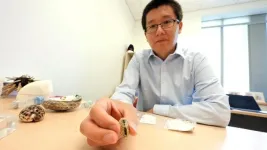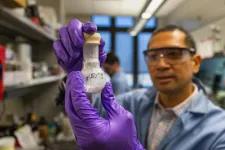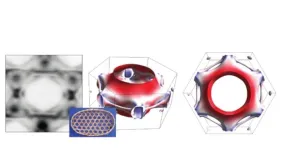- Of the 14 participants enrolled and treated with lenzilumab plus azacitidine, ten are evaluable with three to eighteen months of follow-up and all ten have had a rapid clinical response
- Building upon previously reported positive clinical responses, these additional data demonstrate statistically significant and clinically relevant improvements in hematologic outcomes, along with improvements in inflammatory markers, that occur in the early months after treatment initiation and appear durable
- CMML is a rare, aggressive cancer; approximately 20% of patients survive three years from diagnosis
- No new CMML medications with novel mechanisms of action have been approved in over 30 years and hypomethylating agents, such as azacitidine alone, are currently considered “standard of care”
Short Hills, New Jersey – (June 9, 2023) - Humanigen, Inc. (Nasdaq: HGEN) today extended previously reported results by presenting additional, statistically significant hematologic improvements and reductions in inflammatory markers from lenzilumab, its investigational drug, in a Phase 2/3 trial of treatment-naïve participants with chronic myelomonocytic leukemia and RAS-pathway mutations.
The additional data demonstrate that in all 10 participants with at least three months of treatment with both lenzilumab and azacitidine, blood monocyte count decreased fivefold (P=0.03), the percentage of blast cells and pro-monocytes decreased more than twofold (P=0.04), and C-reactive protein decreased more than threefold (P=NS) with improvements noted after both 3 months and 6 months of this combination treatment. These results suggest lenzilumab may normalize hematologic and inflammatory aberrations in CMML and improve the condition of participants. All ten evaluable participants had a rapid clinical response.
CMML is a rare, aggressive cancer in which levels of monocytes, blast cells, and pro-monocytes are significantly elevated from normal levels. These pathologic changes are accompanied by significantly elevated pro-inflammatory markers, including C-reactive protein. Current treatment options for CMML patients are limited to blood transfusions, hydroxyurea, and supportive care alongside the current standard of care, which includes hypomethylating agents such as azacitidine and decitabine, which have limited response rates of 7% to 18%1, 2, 3 with no proven increase in overall survival.
In the last 30 years, no new medicines with a novel mechanism of action have been approved for CMML patients who are at high risk of death or disease progression.4 Only about 20% of patients diagnosed with CMML survive for three years.5
“The PREACH-M trial findings to date, indicate that lenzilumab may improve treatment response in CMML,” said Humanigen Chairman and CEO Cameron Durrant, MD, MBA. “These results may create the possibility for lenzilumab development in myelodysplastic leukemias. I look forward to sharing the data at the poster presentation at the 2023 European Hematology Association congress in Frankfurt, Germany.”
The presentation, entitled “Lenzilumab and Azacitidine Improve Hematologic Alterations of Chronic Myelomonocytic Leukemia in the PREACH-M Trial,” highlighted new data in poster format (P737) at 6:00 pm CEST on June 9, 2023, during the 2023 European Hematology Association congress.
“Patients with CMML are normally treated with hypomethylating agents such as azacitidine, with reported response rates of just 7% to 18%, usually of limited duration,” said principal investigator Daniel Thomas, MD, PhD, program leader for blood cancer research at SAHMRI and an associate professor of medicine at the University of Adelaide. “Treating patients with lenzilumab appears to be improving clinical parameters, quality of life and systemic inflammation in the patients studied so far, and patients appear to be tolerating lenzilumab well. Critically, clinical responses appear to occur early, prior to the fourth monthly treatment cycle. No patients have relapsed, and we currently have two patients remaining on treatment for more than 18 months.”
Lenzilumab, a granulocyte-macrophage colony-stimulating factor (GM-CSF) neutralizing antibody, prevents GM-CSF from binding to receptors on hematologic progenitor cells. When GM-CSF binds to those receptors, it triggers normal myelocyte proliferation and maturation. In the presence of RAS-pathway mutations, GM-CSF contributes to the hyperproliferation of myelocytes in myelodysplastic leukemias such as CMML, juvenile myelomonocytic leukemia (JMML), and acute myeloid leukemia (AML).6,7,8 Therefore, lenzilumab’s ability to prevent GM-CSF binding to its receptor may inhibit the hyperproliferation in these conditions.
PREACH-M (PREcision Approach to CHronic Myelomonocytic Leukemia), a non-randomized, open-label trial, is being conducted at multiple sites in Australia. It is sponsored by the South Australian Health and Medical Research Institute (SAHMRI), with grant funding from the Australian government and the study drug supplied by Humanigen.
As of May 9, 2023, 14 CMML patients at intermediate or high risk of death or disease progression have received at least one dose of lenzilumab, along with azacitidine. Ten of those participants were evaluable based on at least three months of follow-up, and each experienced a rapid clinical benefit. Twenty-one grade 3 or 4 serious adverse events were observed, of which investigators assessed five as possibly related to lenzilumab.
+++
About CMML
CMML is an orphan disease with an approximate annual incidence of 1-4 cases per million1 in western countries and has limited therapeutic options. CMML is an aggressive and poorly understood cancer with only about 20% of patients surviving up to the three-year mark.9
The incidence of CMML in the US, UK, and Australia is about 1,700 patients annually.9 As an orphan disease, lenzilumab may qualify for certain regulatory and commercial advantages that could expedite development and potential approval. Humanigen and the Principal Investigator are assessing regulatory pathways that may enable early results to support a regulatory submission and potential approval by the Therapeutic Goods Administration in Australia, which could be expanded through Project Orbis10 to the United States and the United Kingdom (https://www.fda.gov/about-fda/oncology-center-excellence/project-orbis).
About the PREACH-M Trial
PREACH-M (PREcision Approach to CHronic Myelomonocytic Leukemia) is a Phase 2/3, non-randomized, open-label clinical trial investigating precision medicine for adults with CMML.11 This trial investigates treatment response rates determined by the Savona Criteria for patients with CMML after administration of lenzilumab alongside azacitidine in patients with RAS pathway mutations. The study also measures the patients’ quality of life, using the MPN Symptoms Assessment Form: Total Symptom Score.
Fourteen study participants were enrolled and treated with lenzilumab and azacitidine as of May 9, 2023, of which ten were evaluable for hematologic and inflammatory parameters based on at least three months of follow-up. The initial data demonstrate that blood monocyte count decreased by fivefold (p=0.03), percentage of blast cells and pro-monocytes decreased by more than twofold (p=0.04), platelet count and hemoglobin concentration both increased and remained elevated at 12 months (p=0.07 and p=0.02, respectively), and craniocaudal spleen size decreased by nearly 50% by 6 months (p=0.03). The inflammatory marker, C-reactive protein decreased by more than threefold (p=NS). All ten evaluable participants had a rapid clinical response.
During the active treatment phase of the study, participants are required to attend clinic visits on Days 1 & 15 of the first cycle, and then on Day 1 of each subsequent 28-day cycle to assess how the participant is tolerating the therapy and ensure ongoing safety.12 In addition to regular safety blood tests throughout each cycle, participants’ disease response assessments are scheduled after 3, 6, 12 and 24 cycles of therapy to measure their disease response.12 Such assessments include blood tests, bone marrow aspirate and trephine, ultrasound of the spleen, physical exam and assessment of transfusion requirements and clinical symptoms.12
Participants who complete 24 cycles of active treatment enter the follow-up phase of the study where they are followed up every 6 months for 24 months for survival, disease status and further CMML-related treatment.11 For patients with confirmed progressive disease or relapse during the active treatment phase of the study, further study treatment will cease. Patients remain on study and are followed up for disease status, survival, and further CMML-related treatment every 6 months until 48 months from Cycle 1, Day 1.11 During the follow-up period, participants no longer receive any investigational drugs but are permitted to receive any CMML treatment at the discretion of the treating clinician.
As part of the screening process, participants are required to have a bone marrow aspirate and trephine to test for certain acquired mutations that can be present in CMML.11 The study is seeking participants with TET2 and/or RAS pathway mutations. Participants with RAS pathway mutations or both TET2 and RAS mutations, receive azacitidine (administered subcutaneously at a dose of 75mg/m2 on Days 1-5, 8-9 or Days 1-7 for a total of 7 doses per 28-day cycle) in combination with lenzilumab (administered intravenously at a dose of 552mg on Days 1 & 15 of Cycle 1. Day 1 only for all subsequent cycles).11
The trial is sponsored by the South Australian Health and Medical Research Institute (“SAHMRI”) and funded by a Medical Research Future Fund grant from the National Health and Medical Research Council of the Australian government to the University of Adelaide. Humanigen provides lenzilumab for use in the study through its Australian subsidiary, Humanigen Australia Pty Ltd. Enrollment is open to newly diagnosed CMML patients who haven’t received any treatment.
Anyone who is interested in learning more about the study, or obtaining additional information can visit the Australian New Zealand Clinical Trials Registry (www.anzctr.org.au).
About Humanigen
Humanigen, Inc. (Nasdaq: HGEN) ("Humanigen"), is a clinical-stage biopharmaceutical company focused on developing lenzilumab, a first-in-class antibody that binds to and neutralizes granulocyte-macrophage colony-stimulating factor. Humanigen is developing lenzilumab as a treatment for chronic myelomonocytic leukemia. Humanigen is also exploring the use of lenzilumab to prevent toxicities associated with CAR-T therapy through investigator-initiated trials. Humanigen is also developing an antibody drug conjugate (ADC) utilizing its EphA-3 targeted monoclonal antibody ifabotuzumab ("ifab") for solid tumors. For more information, visit www.humanigen.com.
About the European Hematology Association
The European Hematology Association serves medical professionals, researchers, and scientists with an active interest in hematology. They are the largest European-based organization connecting hematologists worldwide to support career development and research, harmonize hematology education, and advocate for hematologists and hematology.
About the EHA Hybrid Congress
The EHA2023 Hybrid Congress, being held in Frankfurt, Germany, from June 8-11, 2023, offers an interactive, comprehensive program dedicated to clinical research and practice, basic and translational research, as well as important opportunities for collaboration with stakeholders in the field of hematology. The educational and scientific program highlights state-of-the-art clinical practice, the latest findings in hematology research, and recent approaches on the diagnosis and treatment of hematologic diseases.
Forward-Looking Statements about Humanigen
All statements other than statements of historical facts contained in this press release are forward-looking statements. Forward-looking statements reflect management's current knowledge, assumptions, judgment, and expectations regarding future performance or events. Although management believes that the expectations reflected in such statements are reasonable, they give no assurance that such expectations will prove to be correct, and you should be aware that actual events or results may differ materially from those contained in the forward- looking statements. Words such as "will," "expect," "intend," "plan," "potential," "possible," "goals," "accelerate," "continue," and similar expressions identify forward-looking statements.
Forward-looking statements are subject to a number of risks and uncertainties including, but not limited to, the risks inherent in our lack of profitability and need for additional capital to continue as a going concern; our dependence on partners to further the development of our product candidates; the uncertainties inherent in the development, attainment of the requisite regulatory authorizations and approvals and launch of any new pharmaceutical product; the outcome of pending or future litigation or arbitration; and the various risks and uncertainties described in the "Risk Factors" sections of our latest annual and quarterly reports and other filings with the SEC.
All forward-looking statements are expressly qualified in their entirety by this cautionary notice. You should not rely upon any forward-looking statements as predictions of future events. We undertake no obligation to revise or update any forward-looking statements made in this press release to reflect events or circumstances after the date hereof, to reflect new information or the occurrence of unanticipated events, or to update the reasons why actual results could differ materially from those anticipated in the forward-looking statements, in each case, except as required by law.
Humanigen Investor Relations Contact
Ed Jordan
Chief Commercial Officer
IR@humanigen.com
650-243-3181
Humanigen Media Relations Contact
Charlotte Wray
cwray@rxmedyn.com
646-247-3405
References
Costa, R., et. al. (2010). Activity of azacitidine in chronic myelomonocytic leukemia. Cancer, 117(12), 2690–2696. https://doi.org/10.1002/cncr.25759.
South Australian Registry data, South Australian Health and Medical Research Institute, April 14, 2021
Pleyer, L., et. al. (2014). Azacitidine in CMML: Matched-pair analyses of daily-life patients reveal modest effects on clinical course and survival. Leukemia Research, 38(4), 475–483. https://doi.org/10.1016/j.leukres.2014.01.006
Aim of first-ever CMML study – to improve survival. Leukaemia Foundation. (2023, January 3). Retrieved January 3, 2023, from https://www.leukaemia.org.au/stories/aim-of-first-ever-cmml-study-to-improve-survival/
Ma, L., Jiang, L., Yang, W., Luo, Y., Mei, C., Zhou, X., Xu, G., Xu, W., Ye, L., Ren, Y., Lu, C., Lin, P., Jin, J., & Tong, H. (2021). Real-world data of chronic myelomonocytic leukemia: A chinese single-center retrospective study. Cancer medicine, 10(5), 1715–1725. https://doi.org/10.1002/cam4.3774
Gupta, A. et al. (2021). Juvenile myelomonocytic leukemia-A comprehensive review and recent advances in management. American Journal of Blood Research, 11(1), 1–21. Retrieved July 21, 2022, from https://www.ncbi.nlm.nih.gov/pmc/articles/PMC8010610/pdf/ajbr0011-0001.pdf
Padron, E., et al. (2013). GM-CSF–dependent PSTAT5 sensitivity is a feature with therapeutic potential in chronic myelomonocytic leukemia. Blood, 121(25), 5068–5077. https://doi.org/10.1182/blood-2012-10-460170
Emanuel, P. D., et al. (1991). Selective hypersensitivity to granulocyte-macrophage colony-stimulating factor by juvenile chronic myeloid leukemia hematopoietic progenitors. Blood, 77(5), 925–929. https://doi.org/10.1182/blood.v77.5.925.925
Incidence extrapolated by applying NIH SEER incidence rate of five per one million people found at https://seer.cancer.gov/statistics-network/explorer to the population of U.S., UK, and Australia, Prevalence data also from NIH SEER.
U.S. Food and Drug Administration. A framework for concurrent submission and review of Oncology Products. Retrieved March 20, 2023, from https://www.fda.gov/about-fda/oncology-center-excellence/project-orbis
Australian New Zealand Clinical Trials Registry. Retrieved March 20, 2023, from https://www.anzctr.org.au/Trial/Registration/TrialReview.aspx?ACTRN=12621000223831
Preach-M: Precision medicine for chronic myelomonocytic leukaemia in adults: A phase II trial studying the efficacy of lenzilumab and high dose ascorbate with azacitidine based on molecular profiling. PREACH-M - Victorian Cancer Trials Link. (n.d.). Retrieved January 3, 2023, from https://trials.cancervic.org.au/details.aspx?ID=vctl_actrn12621000223831
END





